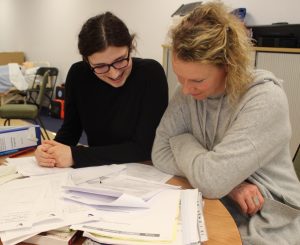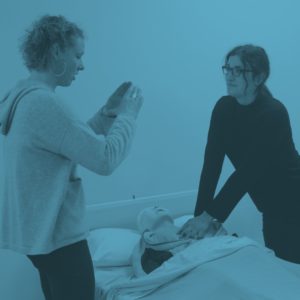As a Level 3 Adult Care Worker you will make a positive difference to someone’s life when they are faced with physical, practical, social, emotional or intellectual challenges.
 You will be expected to exercise judgement and take appropriate action to support individuals to maintain their independence, dignity and control. By providing leadership, guidance and direction at the front-line of care delivery you will be instrumental in improving the health and wellbeing of those receiving care and support.
You will be expected to exercise judgement and take appropriate action to support individuals to maintain their independence, dignity and control. By providing leadership, guidance and direction at the front-line of care delivery you will be instrumental in improving the health and wellbeing of those receiving care and support.
Level 3 Adult Care Workers will in some circumstances have delegated responsibility for the standard of care provided and may supervise the work of other care workers
Level 3 Adult Care Workers may work in residential or nursing homes, domiciliary care, day centres or some clinical healthcare settings.
- Workshops
- Strong assessor support
- Practice assessment
- Portfolio of evidence produced
- Range of assessment methods
- End Assessment
- Enhanced Disclosure and Barring Service process required (DBS)
- The Care Certificate must be achieved as part of the Apprenticeship
- Communication Skills
- Equality & Inclusion
- Personal development
- Safeguarding
- Duty of care
- Person Centred practice
- Health & Safety
- Good practice in handling information
- Optional subject choices available
This qualification can help you succeed in a wide range of healthcare settings, such as:
- Residential care
- Community and primary care
- Acute health environments (eg hospitals)
- Domiciliary services (home care / home help)
- Supported living projects
- Community-based care
- Private care for a person or family.
This qualification also allows candidates to progress to the following City & Guilds qualifications:
- Level 5 Diploma for Assistant Practitioners in Healthcare.
- Level 5 Diploma in Leadership for Health and Social Care and Children and Young People’s Services (Adults’ Advanced Practice).
Apply for this course FAQ Apprenticeship Options
Level 2 Diploma in Care
Level 2 will suit you if you are a care worker or want to get your first care job.
If you’re already working in  care, you probably work mainly under supervision. You may want to increase your skills and take on more responsibility.
care, you probably work mainly under supervision. You may want to increase your skills and take on more responsibility.
A Diploma in Health and Social Care is flexible to suit all fields of health and social care. Learners can select a pathway that suits their role – for example, working with people with a learning disability or people with dementia.
This is the main qualification required by the Care Quality Commission in England and the Care Councils in Wales and Northern Ireland.
These are the personal attributes and behaviours expected of all Adult Care Workers carrying out their roles:
- Care – is caring consistently and enough about individuals to make a positive difference to their lives
- Compassion – is delivering care and support with kindness, consideration, dignity and respect
- Courage – is doing the right thing for people and speaking up if the individual they support is at risk
- Communication – good communication is central to successful caring relationships and effective team working
- Competence – is applying knowledge and skills to provide high quality care and support
- Commitment – to improving the experience of people who need care and support ensuring it is person centred
- Taught sessions
- Strong tutorial support
- Practice assessment
- Portfolio of evidence produced
- Range of assessment methods
- End Assessment
- Enhanced Disclosure and Barring Service process required (DBS)
- The Care Certificate must be achieved as part of the Apprenticeship Standard
- Introduction to communication in health, social care or children’s and young people’s settings
- Introduction to personal development in health, social care or children’s and young people’s settings
- Introduction to equality and inclusion in health, social care or children’s and young people’s settings
- Principles of safeguarding and protection in health and social care
- The role of the health and social care worker
- Implement person-centred approaches in health and social care
- Contribute to health and safety in health and social care
- Handle information in health and social care settings
- Introduction to duty of care in health, social care or children’s and young people’s settings.
This qualification can help you succeed in a wide range of healthcare settings, such as:
- Residential care
- Community and primary care
- Acute health environments (eg hospitals)
- Domiciliary services (home care / home help)
- Supported living projects
- Community-based care
- Private care for a person or family.
This qualification also allows candidates to progress to the following City & Guilds qualifications:
- Level 3 Diploma.
Apply for this course FAQ Apprenticeship Options
Level 5 Operations Departmental Manager
Ideal for individuals who manage teams or projects and are responsible for achieving operational or departmental goals and objectives as part of their organisation’s strategy.
Level 5 managers are responsible for everything from creating and delivering operational plans, managing projects, and leading and managin g teams, to managing change, financial and resource management. Responsibilities also include talent management, coaching and mentoring. Roles may include those of Operations Manager, Regional Manager, Divisional Manager, Department Manager as well as other specialist managers.
g teams, to managing change, financial and resource management. Responsibilities also include talent management, coaching and mentoring. Roles may include those of Operations Manager, Regional Manager, Divisional Manager, Department Manager as well as other specialist managers.
They are accountable to a more senior manager or business owner. Ideal for those working in the private, public or third sector and in all sizes of organisation; specific responsibilities and job titles will vary, but the knowledge, skills and behaviours needed will be the same.
- Workshops
- 1:1 Sessions
- Strong assessor support
- Practice assessment
- E-Portfolio of evidence produced
- Range of assessment methods
- Access to VLE
- End Assessment
- Leading People
- Managing People
- Building Relationships
- Communication
- Operational Management
- Project Management
- Finance
- Self-Awareness
- Management of Self
- Problem Solving and Decision Making
Successful learners can progress to a range of qualifications, including:
- ILM Level 6 Award in Management
- Chartered Manager Degree Apprenticeship (England only)
- Management related degree course
- ILM Level 7 Qualifications in Leadership and Management
Apply for this course FAQ Apprenticeship Options
Level 3 Team Leader or Supervisor
Ideal for individuals who have management responsibilities but no formal training, and are serious about developing their abilities.
 The qualification is made up of a wide range of units covering core management skills – such as understanding how to organise and delegate – plus skills in communication, team leadership, change, innovation and managing people and relationships. They aim to develop effective and confident first-line managers with better skills in building relationships and communicating in teams.
The qualification is made up of a wide range of units covering core management skills – such as understanding how to organise and delegate – plus skills in communication, team leadership, change, innovation and managing people and relationships. They aim to develop effective and confident first-line managers with better skills in building relationships and communicating in teams.
They are accountable to a more senior manager or business owner. Ideal for those working in the private, public or third sector and in all sizes of organisation; specific responsibilities and job titles will vary, but the knowledge, skills and behaviours needed will be the same.
- Workshops
- 1:1 Sessions
- Strong assessor support
- Practice assessment
- E-Portfolio of evidence produced
- Range of assessment methods
- Access to VLE
- End Assessment
- Leading People
- Managing People
- Building Relationships
- Communication
- Operational Management
- Project Management
- Finance
- Self-Awareness
- Management of Self
- Problem Solving and Decision Making
Successful learners can progress to a range of qualifications, including:
- ILM Level 5 Diploma for Leaders and Managers
Apply for this course FAQ Apprenticeship Options
Level 3 Senior Healthcare Support Worker
The Level 3 Diploma in Healthcare Support is an occupational qualification for learners who work in Healthcare Support roles in England.
 This qualification consists of mandatory units covering knowledge and skills’ competencies with optional specialisms which can be combined in flexible ways to reflect the real working context of different learners. As an experienced Support Worker, SHCSWs carry out a range of clinical and non-clinical healthcare or therapeutic tasks, under the direct or indirect supervision of a registered Healthcare Practitioner.
This qualification consists of mandatory units covering knowledge and skills’ competencies with optional specialisms which can be combined in flexible ways to reflect the real working context of different learners. As an experienced Support Worker, SHCSWs carry out a range of clinical and non-clinical healthcare or therapeutic tasks, under the direct or indirect supervision of a registered Healthcare Practitioner.
They may work in a range of services e.g. hospital, community, health or day-case unit, birth centre or midwifery led unit, someone’s home, operating theatre, nursing or care home, assessment centre, hospice, school, prison, GP surgery, charity or voluntary organisation; working in partnership with individuals, families, carers and other service providers.
The pathways that can be delivered by Varsity Training are:
- Adult Nursing;
- Theatre Support;
- Allied Health Profession Therapy Support
- Workshops
- 1:1 Sessions
- Strong assessor support
- Practice assessment
- Portfolio of evidence produced
- Range of assessment methods
- Access to VLE
- End Assessment
- Person centred approaches
- Communication
- Personal development
- Values and behaviours
- Prevention and control of infection
- Handling information
- Mental health and wellbeing
This qualification allows candidates to learn, develop and demonstrate the skills and knowledge required for employment and/or career progression in Healthcare.
Opportunities may also be available to progress to an apprenticeship at level 5 such as the Assistant Practitioner in Healthcare, or to higher education programmes, providing all entry requirements are met
Apply for this course FAQ Apprenticeship Options
Level 2 Diploma in Healthcare – Health Care Support Worker
The Level 2 Diploma in Healthcare Support is an occupational qualification for learners who work in Healthcare Support roles in England.
 This qualification consists of mandatory units covering knowledge and skills competencies with optional specialisms which can be combined in flexible ways to reflect the real working context of different learners.
This qualification consists of mandatory units covering knowledge and skills competencies with optional specialisms which can be combined in flexible ways to reflect the real working context of different learners.
Healthcare support workers (HCSWs) work as part of a team providing high quality and compassionate care to individuals. HCSWs address straightforward problems in day-to-day work, reporting concerns and changes to the appropriate person in a timely manner. They report to a registered Healthcare Practitioner who will directly or indirectly supervise their work.
HCSWs work in a range of healthcare settings and their team may include workers from both health and social care.
Pathways include:
Clinical healthcare support, Healthcare support, Healthcare support service, Allied Health profession, Perioperative support.
- Workshops
- 1:1 Sessions
- Strong assessor support
- Practice assessment
- Portfolio of evidence produced
- Range of assessment methods
- Access to VLE
- End Point Assessment
- Person centred approaches
- Communication
- Duty of care in health
- Personal development
- Equality and inclusion in health
- Values and behaviours
- Prevention and control of infection
- Handling information
- Mental health and wellbeing
- This qualification allows candidates to learn, develop and demonstrate the skills and knowledge required for employment and/or career progression in Healthcare.
- Opportunities may also be available to progress to an apprenticeship at level 3 such as the Senior Healthcare Support Worker
Apply for this course FAQ Apprenticeship Options
Level 2 Adult Care Worker
The Adult Care Worker Standard will suit you if you are a care worker or want to get your first care job.
If you’re already working in  care, you probably work mainly under supervision. You may want to increase your skills and take on more responsibility.
care, you probably work mainly under supervision. You may want to increase your skills and take on more responsibility.
The Adult Care Worker Standard is flexible to suit all fields of health and social care. Learners can select optional units that suit their role – for example, working with people with a learning disability or people with dementia.
This is the main qualification required by the Care Quality Commission in England and the Care Councils in Wales and Northern Ireland.
These are the personal attributes and behaviours expected of all Adult Care Workers carrying out their roles:
- Care – is caring consistently and enough about individuals to make a positive difference to their lives
- Compassion – is delivering care and support with kindness, consideration, dignity and respect
- Courage – is doing the right thing for people and speaking up if the individual they support is at risk
- Communication – good communication is central to successful caring relationships and effective team working
- Competence – is applying knowledge and skills to provide high quality care and support
- Commitment – to improving the experience of people who need care and support ensuring it is person centred
- Taught sessions
- Strong tutorial support
- Practice assessment
- Portfolio of evidence produced
- Range of assessment methods
- End Point Assessment
- Enhanced Disclosure and Barring Service process required (DBS)
- The Care Certificate must be achieved as part of the Apprenticeship Standard
- Introduction to communication in health, social care or children’s and young people’s settings
- Introduction to personal development in health, social care or children’s and young people’s settings
- Introduction to equality and inclusion in health, social care or children’s and young people’s settings
- Principles of safeguarding and protection in health and social care
- The role of the health and social care worker
- Implement person-centred approaches in health and social care
- Contribute to health and safety in health and social care
- Handle information in health and social care settings
- Introduction to duty of care in health, social care or children’s and young people’s settings.
This qualification can help you succeed in a wide range of healthcare settings, such as:
- Residential care
- Community and primary care
- Acute health environments (eg hospitals)
- Domiciliary services (home care / home help)
- Supported living projects
- Community-based care
- Private care for a person or family.
This qualification also allows candidates to progress to the following City & Guilds qualifications:
- Level 3 Diploma.
Apply for this course FAQ Apprenticeship Options
Level 3 Lead Adult Care Worker
As a Lead Adult Care Worker you will make a positive difference to someone’s life when they are faced with physical, practical, social, emotional or intellectual challenges.
 You will be expected to exercise judgement and take appropriate action to support individuals to maintain their independence, dignity and control. By providing leadership, guidance and direction at the front-line of care delivery you will be instrumental in improving the health and wellbeing of those receiving care and support.
You will be expected to exercise judgement and take appropriate action to support individuals to maintain their independence, dignity and control. By providing leadership, guidance and direction at the front-line of care delivery you will be instrumental in improving the health and wellbeing of those receiving care and support.
Lead Adult Care Workers will in some circumstances have delegated responsibility for the standard of care provided and may supervise the work of other care workers
Lead Adult Care Workers may work in residential or nursing homes, domiciliary care, day centres or some clinical healthcare settings.
- Workshops
- Strong assessor support
- Practice assessment
- Portfolio of evidence produced
- Range of assessment methods
- End Assessment
- Enhanced Disclosure and Barring Service process required (DBS)
- The Care Certificate must be achieved as part of the Apprenticeship
- Communication Skills
- Equality & Inclusion
- Personal development
- Safeguarding
- Duty of care
- Person Centred practice
- Health & Safety
- Good practice in handling information
- Optional subject choices available
This qualification can help you succeed in a wide range of healthcare settings, such as:
- Residential care
- Community and primary care
- Acute health environments (eg hospitals)
- Domiciliary services (home care / home help)
- Supported living projects
- Community-based care
- Private care for a person or family.
This qualification also allows candidates to progress to the following City & Guilds qualifications:
- Level 5 Diploma for Assistant Practitioners in Healthcare.
- Level 5 Diploma in Leadership for Health and Social Care and Children and Young People’s Services (Adults’ Advanced Practice).
Apply for this course FAQ Apprenticeship Options
Level 4 Lead Practitioner in Adult Care
The Lead Practitioner in Adult Care will guide and inspire team members or colleagues to make positive differences to someone’s life when they are faced with physical, practical, social, emotional, psychological or intellectual challenges.
A Lead Practitioner may be a coach and mentor to others, or have a role in assessing performance and quality of care delivery. Lead Practitioners in Adult Care may work in residential or nursing homes, domiciliary care, day centres, a person’s own home or some clinical healthcare settings. As well as covering Lead Practitioners in Adult Care this standard also covers Lead Personal Assistants who can work at this senior level but they may only work directly for one individual who needs support and/or care services, usually within their own home.
- Taught Blended Workshops
- Named Assessor
- Assessment of practice
- Portfolio of evidence produced
- Range of assessment methods
- Dignity and human rights
- Communication
- Safeguarding
- Health and wellbeing
- Professional development
- Tasks and responsibilities
This qualification allows candidates to progress into employment or to the following City & Guilds qualifications:
- Level 5 Leader in Adult Care.
- Level 5 Operations or Departmental Manager.
Level 5 Diploma for Assistant Practitioners in Healthcare
This diploma is aimed at all those interested in holding an Assistant Practitioner qualification. It focuses on consolidation of learning and on embedding consistently good practice in core areas, as well as the development of additional knowledge and skills.

The Assistant Practitioner programme is ideally suited to those individuals that work in a senior position in such areas as Nursing Homes, Hospices, Acute Trusts and Community Interest Companies (formally Primary Care Trusts/PCTs). Varsity Training is one of the few private sector providers of this qualification and already deliver the course in a range of statutory, private and voluntary settings.
Having completed this diploma, workers may then progress into undergraduate healthcare professional programmes such as Nurse training.
This is aimed at all Assistant Practitioners or those individuals that wish to become Assistant Practitioners. It is only available to those aged 18 and over.
- Taught sessions
- Strong tutorial support
- Practice assessment
- Portfolio of evidence produced
- Wide range of assessment methods
- Apprenticeship Framework Available
- Interpersonal Communication Skills
- Person Centred Practice
- Equality, Diversity & Inclusion
- Safeguarding
- Quality Health Care
- Health & Safety
- Body Structures & Systems
- Assessment of Health & Well-being
- Physiological Measurements
This Level 5 qualification could lead to a range of roles within Health Care.
Assistant Practitioners hold a wide range of level 4 posts within the NHS throughout a wide range of acute settings.
Assistant Practitioners hold posts in Nursing Homes, Hospices, Day Centres and Health Centres.













